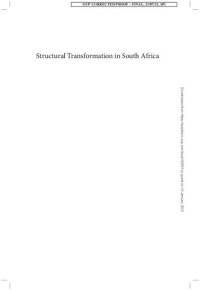
Ebook: Structural Transformation in South Africa The Challenges of Inclusive Industrial Development in a Middle-Income Country
- Year: 2022
- Publisher: Oxford University Press
- City: Oxford
- Language: English
- pdf
Taking South Africa as an important case study of the challenges of structural transformation, this volume offers a new micro-meso level framework and evidence linking country-specific and global dynamics of change, with a focus on
the current challenges and opportunities faced by middle-income countries. Detailed analyses of industry groupings and interests in South Africa reveal the complex set of interlocking country-specific factors underlying the patterns of structural transformation over three decades—from the 1990s and the first democratic election in 1994, up to 2019. The book also shows how new global drivers of change—digital industrialization, global value-chain (GVC) consolidation, and sustainability management—are reshaping structural transformation dynamics across middle-income countries like South Africa. While these new drivers of
change are disrupting existing industries and interests in some areas, in others they are reinforcing existing trends and configurations of power.
By structural transformation, we refer to changes in the structure of the economy
towards activities with the scope for sustained high growth in productivity,
in particular through cumulative improvements. This has a strong sectoral
dimension, and specifically recognizes the central importance of industrialization
to a path of sustained economic growth and catching-up.
We draw attention not
just to the need for change in the broad sectoral composition of the economy, but
also to the heterogeneity within, and linkages between, sectors. Developments
such as the ‘industrialization of freshness’, digitalization and technological
upgrading, and the changing nature of value-chain
linkages between activities all
point to the need for a sophisticated and nuanced approach to sub-sectors
and to
the diversity of activities within sectors.
the current challenges and opportunities faced by middle-income countries. Detailed analyses of industry groupings and interests in South Africa reveal the complex set of interlocking country-specific factors underlying the patterns of structural transformation over three decades—from the 1990s and the first democratic election in 1994, up to 2019. The book also shows how new global drivers of change—digital industrialization, global value-chain (GVC) consolidation, and sustainability management—are reshaping structural transformation dynamics across middle-income countries like South Africa. While these new drivers of
change are disrupting existing industries and interests in some areas, in others they are reinforcing existing trends and configurations of power.
By structural transformation, we refer to changes in the structure of the economy
towards activities with the scope for sustained high growth in productivity,
in particular through cumulative improvements. This has a strong sectoral
dimension, and specifically recognizes the central importance of industrialization
to a path of sustained economic growth and catching-up.
We draw attention not
just to the need for change in the broad sectoral composition of the economy, but
also to the heterogeneity within, and linkages between, sectors. Developments
such as the ‘industrialization of freshness’, digitalization and technological
upgrading, and the changing nature of value-chain
linkages between activities all
point to the need for a sophisticated and nuanced approach to sub-sectors
and to
the diversity of activities within sectors.
Download the book Structural Transformation in South Africa The Challenges of Inclusive Industrial Development in a Middle-Income Country for free or read online
Continue reading on any device:

Last viewed books
Related books
{related-news}
Comments (0)